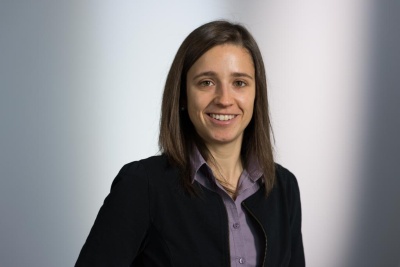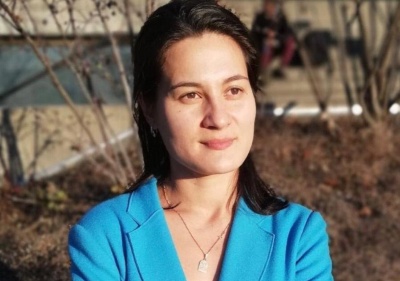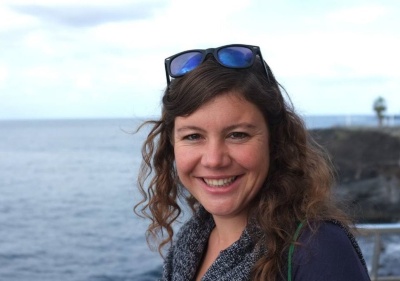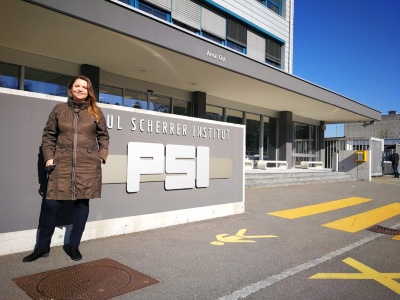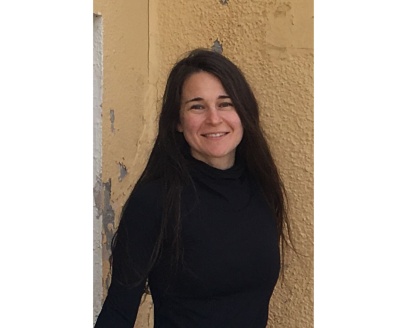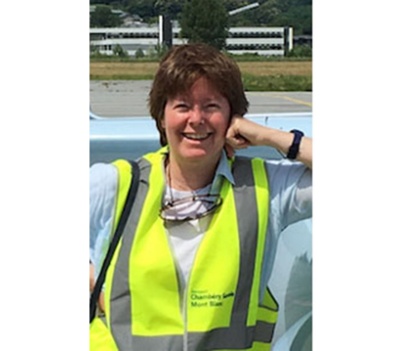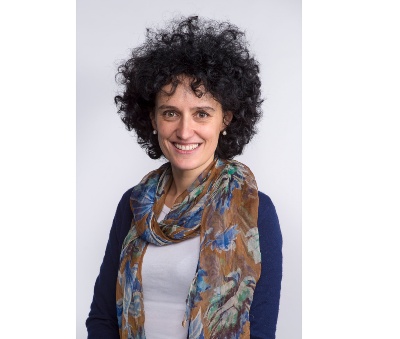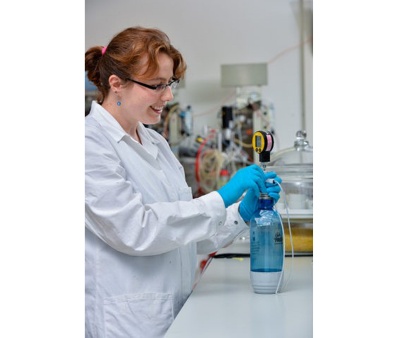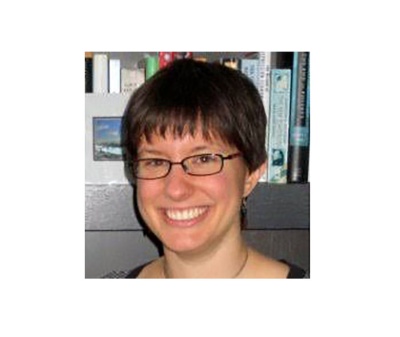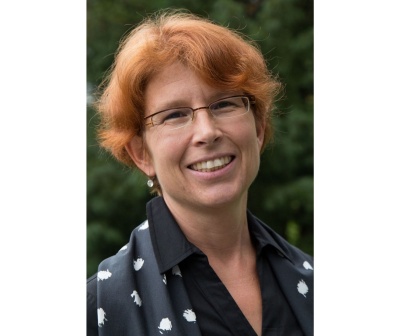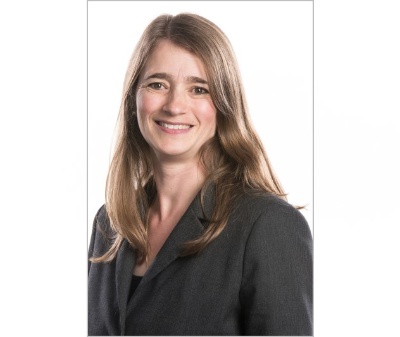SCCER-f Interviews
Mireia Roca Riu
Mireia Roca Riu joined the team of the Learning Lab - Future Transport Systems at SCCER Mobility in November 2019. In her work as a postdoctoral researcher, she coordinates the projects of the Digitalization Action Plan, which was called into life to build up new research capacity on the topic of digitalization and mobility. The focus of her work is not only to manage and monitor the projects, but also provide a platform for cooperation and exchange. Before joining SCCER Mobility, Mireia Roca Riu was a postdoctoral researcher at the Institute for Transport Planning and Systems at ETH Zurich working on analyzing the effects of automation in logistics and its impacts on traffic performance at an urban level. In 2015, she received her PhD degree from the Technical University of Catalonia in Statistics and Operations Research. There she also completed her master’s studies in the same field and her bachelor’s degree in mathematics. During her academic career, she has participated in several mobility-related efforts on a national and European level, for example the project Strategies and measures for smarter urban freight solutions (STRAIGHTSOL). One of the reasons Mireia Roca Riu finds working in energy research exciting is because “it is not only about being very good at your specialty, but also understanding other methods and finding a common way to understand each other and work together.”
Olga Weiss
Olga Weiss is a postdoctoral researcher in the Energy Systems Group in the Aerothermochemistry and Combustion Systems Laboratory at ETH Zurich. Her research focusses on simulating transition pathways for the Swiss energy and transport sectors considering technological advancements, business models as well as economic, social and political factors. Within SCCER Mobility, this effort is part of the Joint Activity Coherent Energy Demonstrator Assessment (CEDA). Previously, Olga Weiss was a research associate at the Lappeenranta University of Technology in Finland where she conducted model-based analyses of electricity and gas markets and energy-related policies and regulations. She obtained her PhD and Master’s degrees in Electricity Markets and Power Systems from the same university. She also holds a Master’s degree from Peter the Great St. Petersburg Polytechnic University in Power Systems and Networks. When thinking about the future, Olga Weiss is convinced that the mobility and energy sectors will progress towards being more sustainable with lower emissions. In part, she thinks this can be achieved with a coupled energy-mobility system “dominated by renewable energy sources, decentralized smart energy systems with proactive consumers.”
Stephanie Wegmann
Since April 2019 Stephanie Wegmann is a researcher at the Institute of Polymer Engineering at the University of Applied Sciences and Arts Northwestern Switzerland (FHNW). There she is responsible for acquisition, project management and supervising students. Within the activities of Capacity Area A3 of SCCER Mobility, her research focusses on life cycle assessment of new processes to produce lightweight composite materials for automotive applications. Before she joined FHNW and SCCER Mobility, she worked as a development engineer at Degradable Solutions AG in Schlieren for three years. In the field of biomedical engineering, she worked on developing new processes for bone replacement materials. She obtained her Bachelor’s and Master’s degrees in Mechanical Engineering at ETH Zurich. When asked how mobility will change in the next 10 years, she thinks that “the entire mobility system will again increase its speed: everything will be interconnected and make our lives even faster-paced. In the midst of this, we have to find new ways to deal with the resources we have without destroying the entire environmental system.”
Nicole Aegerter
Nicole Aegerter is a PhD student at the Laboratory of Composite Materials and Adaptive Structures (CMASLab) at ETH Zurich. Already during her master’s studies in Material Science at ETH Zurich, she was hooked by the idea of developing lightweight materials to reduce vehicular energy demand. Therefore, she decided to pursue a doctorate and continue with research in the field of thermoplastic composites for lightweight structural applications. By investigating efficient processes to manufacture composites in high-volume, her research contributes to light weighting and thus energy saving in mobility. Nicole is convinced that we will not find a “one fits all solution” for our energy demands, but we rather need to find a balanced mix between social, political and technical measures to tackle the problem.
Kasia Arturi
Kasia Arturi is a postdoctoral researcher in the Catalytic Process Engineering group at PSI and member of SCCER BIOSWEET. She studied chemistry and biotechnology at Aalborg University, where she also conducted her PhD research on the topic of hydrothermal valorization of waste products. At PSI, her work aims at increasing the overall sustainability of biomass biorefinery schemes by valorization of the lignin fraction into aromatic building blocks from which new types of green chemicals and biodegradable materials can be produced. More specifically, her research topic deals with mild oxidative solvothermolysis of lignins in biphasic systems. Concerning the energy transition, Kasia Arturi believes that we face a serious challenge, which is fascinating as it also presents unique opportunities to “force paradigm shifts from mindless consumption towards multilateral sustainable development.” Her research in the field of bioenergy may support the energy transition as it has the potential to change the way we produce chemicals and make biomass valorization economically attractive.
Shelly Arreguin
Shelly Arreguin is a researcher in the Composite Materials and Processing group within CMASLab at ETH Zurich and member of Capacity Area A3. Prior to this, she worked at Empa Dübendorf managing a cross-functional project with academic and industrial partners. She completed her PhD at the University of Washington, Seattle working simultaneously at the Pacific Northwest National Laboratory designing high temperature, radiation tolerant ceramics to increase the fuel efficiency and proliferation resistance of next generation nuclear reactors. Her current research is at the intersection of materials and chemistry, focused on the processing and property relationships of complex material systems for energy, environmental and mobility applications. When asked how mobility will change in the future, Dr. Arreguin thinks that mobility “will address many of its current issues by migrating towards ride sharing, increasing overall energy efficiency of vehicles as well as substantial modifications to our current behavior patterns.” Additionally, she expects “that walking and biking will play a larger role in mobility, for both reduction of greenhouse gas emissions and enhanced personal fitness.”
Véronique Michaud
Prof. Dr. Véronique Michaud heads the Laboratory for Processing of Advanced Composites and is Associate Dean of the School of Engineering, in charge of Education, at EPFL. Her research addresses fundamental questions related to the manufacturing of polymer based composite materials, as well as on integration of functions (adaptive composites with shape memory alloys or piezoelectric particles, integration of optical fibers, shear thickening suspensions and/or self-healing mechanisms). Within SCCER Mobility, she is active in Capacity Area A3 that investigates technologies and strategies to minimize non-propulsive energy demand of vehicles for improved efficiency. This includes new processing routes for high volume production of lightweight thermoplastic materials. These could help reduce the energy consumption of vehicles by decreasing their weight. Dr. Michaud stresses that other non-propulsive aspects need to be considered as well, for example “a large fraction of the energy consumption in a bus or tram is related to passenger comfort (heating/cooling), and that this point is not really well tackled yet from a vehicle conception perspective”.
Judith Krautwald
Dr. Judith Krautwald is a Research Associate at the Zurich University of Applied Sciences (ZHAW), School of Life Sciences and Facility Management, Department of Environmental Biotechnology. She works on developing microbiological and thermal processes to obtain renewable energy from biomass with a current focus on biomass pretreatment prior to anaerobic digestion and biological methanation of CO2. She finds bioenergy research both challenging and fascinating because “compared to, for example, wind and solar energy, there is not one optimal technology, but rather a whole pool of technologies that are more or less suitable depending on the location, the type of biomass and the needs of consumers.” As there is no single bioenergy solution and since it appears to be less attractive to the public than other renewable energy sources, Dr. Krautwald calls for a need to “do much more educational work in this area in order to develop a good understanding of the technologies amongst the population.”
Francesca Cellina
Francesca Cellina leads the Sustainability and Society research group at the Institute for Applied Sustainability to the Built Environment at the University of Applied Sciences of Southern Switzerland (SUPSI). Within SCCER Mobility, her research investigates the potential and effectiveness of ICT-based tools for increasing environmental consciousness. In particular, how these tools can influence individual mobility choices and patterns and ultimately aid in reducing the overall mobility demand. Research efforts are highly participatory and “in our projects, we always interact with citizens and stakeholders, and recently even started co-designing possible solutions with them”, she says.
Elisabeth Anne Cazier
Dr. Elisabeth Anne Cazier is a post-doctoral researcher at Bern University of Applied Sciences. She works on the use of fermentation or anaerobic digestion of bio-waste to produce methane, chemical molecules or energy. Her particular research field is the use of pretreatments to improve the production of methane from agricultural waste. Elisabeth values the exchange with other researchers within the SCCER BIOSWEET, ‘I am keen on participating to the SCCER BIOSWEET events since it is interesting to know what is happening outside of my field’, she says.
Adelaide Calbry-Muzyka
Dr. Adelaide Calbry-Muzyka is a post-doctoral researcher in the Thermal Process Engineering group at the Paul Scherrer Institute. She is contributing to several projects within the SCCER BIOSWEET. Her work focuses on the use of biomass for the generation of grid-quality biomethane and electricity. In particular, she looks at developing and validating specialized gas cleaning processes for new process chains developed in the SCCER BIOSWEET. She has also worked on assessments of the total potentials and costs for electricity generation from domestic biomass resources in Switzerland.
Astrid Björnsen Gurung
Dr. Astrid Björnsen Gurung is Coordinator of the Research Program ‘Energy Change Impact’ (ECI), a joint activity of the Swiss Federal Research Institute WSL and the Swiss Federal Institute of Aquatic Science and Technology Eawag. She is member of the Advisory Board of the SCCER BIOSWEET and initiated a Working Group on Knowledge and Technology Transfer with representatives from all SCCERs, NRPs 70 and 71 and other relevant initiatives. Astrid is a relentless analyst, synthesizer and addicted networker. Her current research interests cover various sources of renewable energy and the anticipated impacts of resource use on the environment, landscape, economy and society.
Bettina Furrer
Bettina Furrer is Professor for Sustainability and Technology at Zurich University of Applied Sciences (ZHAW) and since 2012 Head of its Institute for Sustainable Development (INE). She also holds the position of Deputy Head of the SCCER Energy Society and Transition (CREST). Bettina’s research focuses on the interface between sustainability and technology with particular emphasis on the sociotechnical transition of energy systems. Other research interests are technological innovation systems and business models related to and financing of renewable energy and energy efficiency.
SCCER Interviews is a series of interviews of SCCER’s members aiming at increasing the visibility of the female scientist active within the energy field and encouraging young scientist to pursue an academic carrier. It is a joint activity of all 8 SCCERs.
!!! This document is stored in the ETH Web archive and is no longer maintained !!!
